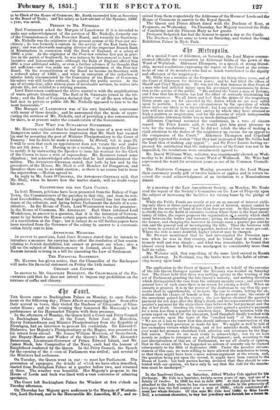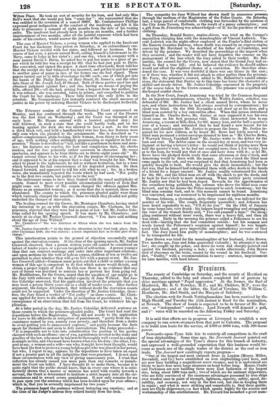In the Insolvent Court, on Saturday, Alfred Whaley Cole applied
for his discharge. Mr. Cole is a barrister, twenty-seven years of -age, and one of a family of twelve. In 1849 he was in debt 400/. At that period he became attached to the lady whom he has since married, and she in the generosity of love gave him the full control over a sum of 16001., which constituted almost her whole fortune. Of this -SUM Mr. Cole lent 14801. to Miss Lauta Bell, a noted.= character, to bay ter jewellerysmd furnish her a house ilk •
Wilton Place. He took no sort of security for his loan, and had only Miss Bell's word that she would pay him "some day ": she represented that she was entitled to the reversion of a sum of 30001. Mr. Commissioner Phillips expressed great indignation at the conduct of the insolvent, and felt it his duty to pronounce a remand of eight months from the date of his vesting order. The insolvent had already been in prison six months, and a further imprisonment of two months, after all the painful exposure which had been made of his conduct, would answer the justice of the ease.
The case of Harriet Vickers, a young woman who applied to the Insolvent Court for her discharge from prison on Saturday, is an extraordinary one. Harriet Vickers resided with her sister, and followed no business. In the course of last year, a person named Scott, calling himself a Lieutenant in the Navy, came to lodge at her sister's and one day, when in company with a man named David J. Davis, he asked her to put her name to a piece of paper which he told her was a receipt for 601. that he had just paid to Davis. She consented, and signed the paper. A short time afterwards, Scott told her that the receipt she had witnessed was incorrect, and got her to put her name to another piece of paper in lieu of the former one she had signed. These papers turned out to be bills of exchange for GO/. each ; one of which got into the hands of Mr. Philip Beyfus, of Bury Street, St. James's, and the other into those of Mr. Joseph Joel, 49 Strand. Both of these parties sued her and obtained judgment against her ; and she, having no means of paying the bills, offered 201.—all she had, arising from a bequest from her mother, but it was refused ; she was arrested, taken to prison, and compelled to petition the Court for her discharge. These bills formed the only debts in the schedule. Mr. Commissioner Law instantly rendered the small measure of justice in his power by ordering Harriet Vickers to be discharged forthwith.



























 Previous page
Previous page